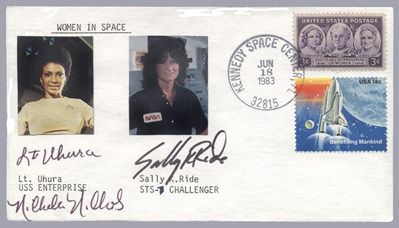Space Cover 294: Lt. Uhura and Sally RideIn the early movies, women in space had to serve as the damsels in distress. Flash Gordon's (Buster Crabbe's) co-star, Dale Arden (Jean Rogers) was such an example. In many other movies women usually played the daughter of a scientist, while the men continued getting them out of scrapes.
Then came Gene Rodenberry's Star Trek. One of the five major personages on the bridge was not only a woman, but a black woman, and she served as the communication's officer. It was a major breakthrough and an actress named Nichelle Nichole was given the role of Lt. Uhura aboard the starship, Enterprise. She was, and has continued to be, an inspiration for African Americans and many others.
At the end of the first season of Star Trek Nichols told Rodenberry that she would be leaving the show to pursue a career on Broadway. But she was confronted by Dr. Martin Luther King, Jr., who told her that she should not quit because of how important it was for everyone to see her. She changed her mind and stayed on. Uhura's continued presence through the rest of the show and six films is a legacy that altered the perceptions of countless people across the world.
In an NAACP speech in Washington, D.C., Nichols criticized NASA for failing to select qualified women and minority candidates for the astronaut corps and she cited examples of qualified people who had applied but were rejected up to five times. She stated that NASA was having its sixth astronaut candidate recruitment, but women and ethnic minorities felt they were disenfranchised and stopped applying.
NASA officials attending her speech responded by inviting Nichols to NASA Headquarters the next day. They wanted her to assist them in persuading women and people of ethnic backgrounds that NASA was serious about recruiting them.
"I told them, 'You've got to be joking!' I didn't take them seriously," she said. They weren't.
She accepted the request and her success at getting good candidates to apply for astronaut training resulted in NASA's selection of five women, along with three African-American men and an Asian. One of the first women she recruited was Sally Ride, shown on the above STS-7 launch cover. (Note the American Women and Shuttle stamps used).
Among her other better-known recommendations for recruitment were Charles Bolden, later a NASA Administrator, and Mae Jemison, who later obtained a small role in a Star Trek episode.
— Ray E. Cartier











